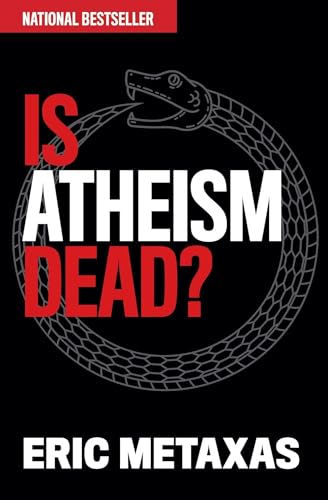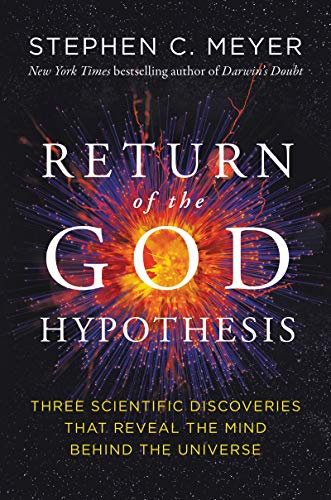Dec. 15, 2021 Dinesh D'Souza talks to Eric Metaxas.
UPDATE: In the video Dinesh D'Souza is talking to Eric Metaxas, author of the national bestseller "Is Atheism Dead" about the fine-tuning of the universe. The Discovery Institute has compiled a list of examples. While the going narrative runs as follows: Planet Earth is common as muck; therefore it stands to reason we are not alone. Except that it's still awfully quiet at SETI's. The contrary seems to be the case: the universe is so minutely fine-tuned that the odds of finding life elsewhere has come down considerably.

Tags: Scientism, religion
Dec. 12, 2021
BEYOND THE DOGMA OF DARWINISM
The Scientific Revolution was built upon the foundation of ancient Greek learning and science in the Middle Ages, as it had been elaborated and further developed by Roman/Byzantine science and medieval Islamic science [1]. Some scholars have noted a direct tie between "particular aspects of traditional Christianity" and the rise of science. The "Aristotelian tradition" was still an important intellectual framework in the 17th century, although by that time natural philosophers had moved away from much of it.
And that is precisely the point where the trouble with Rationalism started; by moving away from the One Reality Universe of the Aristotelian School that bound together the discoveries of philosophy, religion and science, embracing instead the dualism of Plato that placed Heaven in opposition to Earth, Body to Mind and Left to Right, etc. , a mechanism now fully automated in the Western paradigm.
Traditionalists and a new branch of thinkers on the Right, for example Yoram Hazony, author of "The Virtue of Nationalism" tend to point to the Enlightenment as the root of all 'modern' evil. Philosophy Prof. Stephen Hicks in his thesis "Explaining Postmodernism" has warned against throwing the baby with the bathwater.
The Early Modern Period
The scientists of the Scientific Revolution in the Early Modern Period were not 'deists' or reluctant Christians as some critics claim. They were truth seekers, thoroughly rooted in the Greco-Roman and Judeo-Christian thought of the Scholastics in the Renaissance, brought to the West after the Latin sacking of Constantinople. They fully supported the Biblical creation story and the idea of an intelligent design behind Creation. The Wiki on the Early Modern Period throws further light:
The early modern period of modern history follows the late Middle Ages of the post-classical era. Although the chronological limits of this period are open to debate, the timeframe spans the period after the late post-classical or Middle Ages (c. 1400–1500) through the beginning of the Age of Revolutions (c. 1800).
Enlightening or the Enlightenment?
Part of the problem lies in the Skepticism, that is central to science itself: doubt can advance better theories, but if taken too far it can also undermine morality. Which is where we are today. For more problems in science check EPISTEMOLOGY: 5 COGNITIVE SALADS THAT DESTROY REASON on Oct. 17, 2021.
The root of the current problem started in earnest with the idealism of Immanuel Kant (1724-1804) and the anti-rational era of Romanticism in the 19th century, that saw the birth of Darwinism and Socialism, and laid the groundwork for Communism and its twin ideology, National Socialism (a.k.a. Nazism). Professor Hicks thesis in essence runs as follows:
Often erroneously classified as a hero of the Enlightenment, Immanuel Kant in his mindset is entirely antithetical to the values of the era that preceded him (...) Kant's Platonist subjectivist view on reality opened the door to the acceptance of contradiction in logic that only came to full fruition under his follower, G.W.F. Hegel and his student, Karl Marx. (...)
Kant laid the groundwork for the full blown subjectivism in epistemology we see today displayed in popular culture to the point that the very existence of objectivity itself is under attack. (...) Kant's 'trick' was to stretch reason beyond the limits of common sense and context. He then used the absurd result to discredit reason. (...) Postmodernists have made it their own, applying it in the present discourse to their heart's content.
Prof. Hicks' argument in conclusion is that the enlightening period that injected the element of reason into the Western paradigm encompasses roughly a period from 1400 to 1550, while the Storm Und Drang of the late 18th and 19th century commonly referred to as the Enlightenment represents an anti-rational reaction against reason. (As were the Protestant upheavals of the early 16th century by the way.)
The God Hypothesis
Meyer's three scientific points of evidence for the Mind behind the Universe are 1. singularity as the origin of the Universe, 2. fine-tuning of the Universe, 3. information in the biosphere.
The Singularity Theorem refers to a point of creation, an extremity beyond which all reason collapses and that answers the question why the First Cause must be sought beyond the material. Matter becomes so densely compacted and space becomes so infinitely curved, at which point all physical reasoning becomes impossible.
Before that point there would be neither space, nor time or energy, because these come into being at that point of singularity. So you can't explain the origin of the Universe as the result of a material Cause. There was no matter there to do the causing. Science does not support Materialism.
This is just one mind blowing scientific discovery that was reached just as well through Judeo-Christian Revelation and philosophy (Aquinas' five proofs of God's existence).
On Meyer's point two -- the fine-tuning of the Universe -- we shall be posting more in the future, as there is too much material on this subject to handle in a single posting.
In the following lecture Stephen Meyer explains point three of the God Hypothesis, information in the biosphere. The Cambrian Explosion, a relatively short period of time is which a myriad of body plans appear, contrary to the theory of Darwin, which poses the exact opposite.
Note
Tags: Scientism, religion


